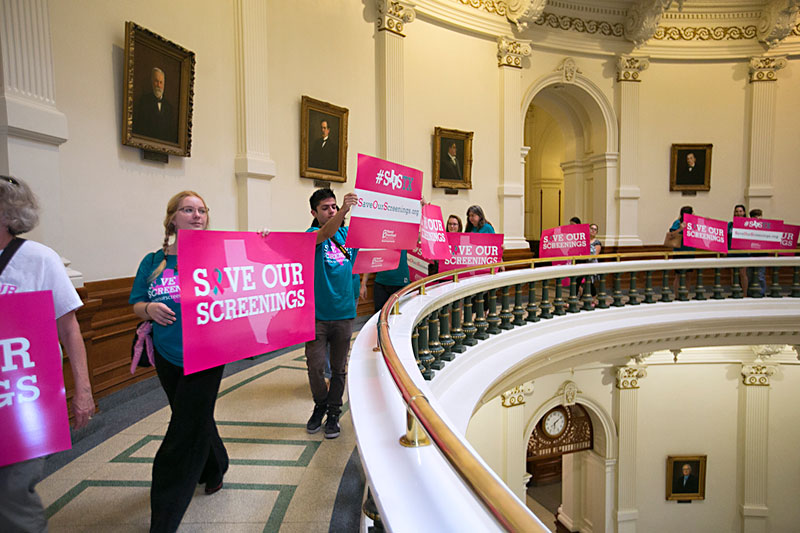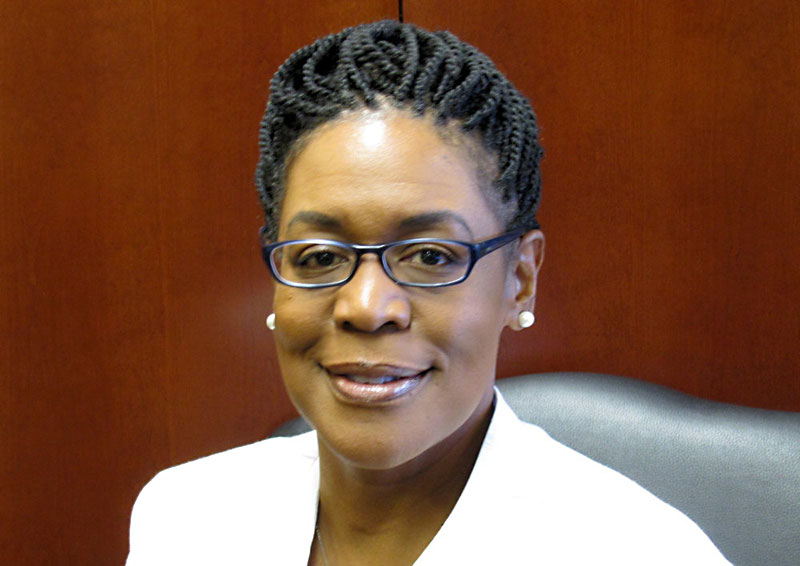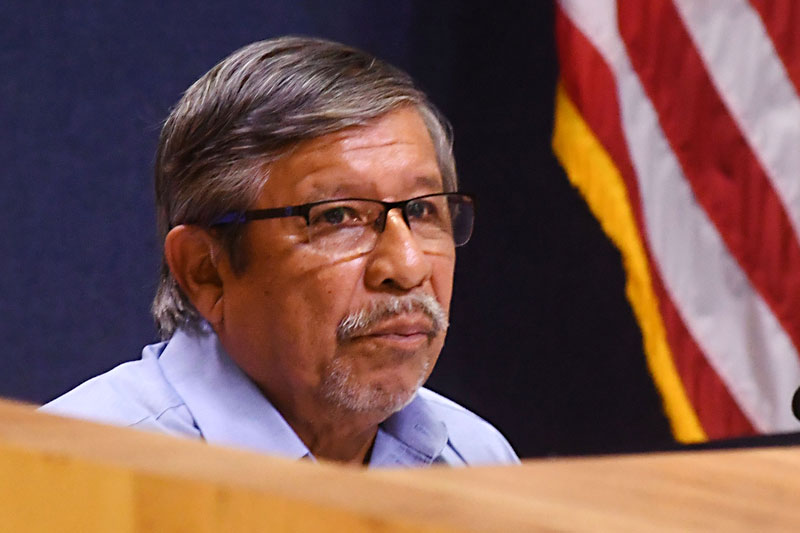Texas Anti-Choice Legislation Continues to Damage Health Care and Undermine Local Control
As GOP postures with SB 22, women’s health care pays the price
By Mary Tuma, Fri., May 17, 2019
Couch surfing at her sister's apartment, college graduate Katie Hansen was in between jobs when she first moved to Austin in 2012. Hansen was due for her annual well-woman checkup but as an unemployed and uninsured 24-year-old, she didn't have a lot of options. She turned to the Planned Parenthood clinic on East Seventh Street and Chicon, where she quickly was able to receive an affordable comprehensive exam, including a screening for sexually transmitted infections, Pap smear, and low-cost contraception. The quality of the care and timeliness of the service felt "empowering and comforting"; taking ownership of her reproductive health care was a hugely important moment in her young adult life.
Without the clinic's reputation as a trusted provider in the community, Hansen says she would have been lost. "I don't know where I would have gone other than that Planned Parenthood clinic," says Hansen. "I wouldn't even have known where to start looking."
Now Hansen is a 31-year-old Dell Medical School student preparing to deliver OB-GYN care, and she has an even deeper appreciation for her experience. The clinic, she says, is a "valuable resource" that offers everything from cervical cancer screenings and HIV tests to LGBTQ health care such as gender affirming hormone therapy not easily found in all health clinics.
"It's so important that everyone has access to affordable and quality reproductive health care services," says Hansen. "But finding a family planning health care provider is challenging, and not all providers are created equal. Planned Parenthood has been around for a long time and are doing an unparalleled level of work in a health system that is daunting and difficult for people to navigate. If you really want to be serious about public health, you have to have a robust safety net, and Planned Parenthood fills that role."
For patients like Hansen and the more than 5,000 that enter the clinic each year, that access is in jeopardy thanks to the Texas Legislature. Senate Bill 22 by anti-choice stalwart Sen. Donna Campbell, R-New Braunfels, bars any "taxpayer resource transaction" between a city or county and an abortion provider or affiliate. A major priority for Lt. Gov. Dan Patrick and groups including Texas Right to Life, the bill aims squarely at the city of Austin's $1-a-year lease agreement with Planned Parenthood of Greater Texas for the Eastside clinic space, in effect since 1973. The legislation would allow the Texas attorney general to file suit to seek an injunction to block that agreement and others like it, as well as recover attorney's fees and costs. (Eyes are on SB 22, as it is farther along in the process than its House counterpart, House Bill 1929 by freshman Rep. Candy Noble, R-Allen.)
A similar measure passed the Senate in the 2017 special session, but was blocked in the House State Affairs Committee. This time, under a new chairman – Rep. Dade Phelan, R-Beaumont – the committee voted the bill out 7-2. SB 22 is pending in the House Calendars Committee, meaning it could be heard by the full Texas House any day now, or it could snake its way into a possible special session, as we have seen with abortion legislation in the recent past.

Legislators like Campbell chastise Austin and other cities for "subsidizing" the abortion industry with "sweetheart" deals even though no local taxpayer dollars flow to abortion care – the Lege did away with that back in 2011 – and the East Austin Planned Parenthood doesn't offer abortion care. But it does offer birth control, STI testing and treatment, pregnancy tests, HIV tests and treatments (PrEP and PEP), UTI treatments, breast and cervical cancer screenings, and other care that helps reduce unplanned pregnancy – and thus, abortion – as well as myriad other public health problems.
Aside from direct medical services such as the kind provided at the East Seventh Street clinic, SB 22 would cripple partnerships between other Texas cities and Planned Parenthood to educate residents about long-acting contraception, teen pregnancy prevention, and STI testing, to name a few. The collateral damage of the Lege's anti-abortion crusade will be felt most acutely by low-income women, often women of color – the most vulnerable and marginalized in the community, and the most in need of affordable health care.
A "Critical" Community Resource
In late March, Mayor Steve Adler, joined by Council Members Greg Casar, Pio Renteria, Jimmy Flannigan, and Paige Ellis and Travis County Judge Sarah Eckhardt, stood alongside employees and patients at the Planned Parenthood clinic to publicly oppose SB 22 as a threat to public health. "It is imperative that the city of Austin and other governmental entities maintain the ability to meet the health care needs of their communities, and that's what Austin is doing," said Adler at the time.
Austin and other municipalities have been besieged by attacks on local control for several Lege sessions, and SB 22 is no exception. Indeed, it's a one-two punch – tying the hands of localities as they try to create health care access for their citizens and restricting women's reproductive rights, two servings of red meat for the GOP primary voter. Eckhardt sees women's bodily autonomy in a different light from heritage tree protection or plastic bag bans: "Reproductive rights shouldn't be caught up as a local control issue – they are a fundamental right," she tells us. "[SB 22] curtails people's personal liberties for political posturing. I believe the government exists to level the playing field, not to restrict the rights of individuals – this is a kind of tyranny."
Within walking distance of public housing at Chalmers Courts and Santa Rita Courts as well as Huston-Tillotson University, the Planned Parenthood center – equipped with its own in-house lab and pharmacy – is a vital resource in the community, says Renteria, whose District 3 includes the clinic. Over the years, his own family members have been patients at the clinic, he tells us. "They provide a very critical service to the people, many who are people of color, in our community. It would be devastating for us to lose that service," says Renteria.
In District 3, 32.3% of its residents go without health insurance, according to city data (the second-highest percentage among Austin's 10 council districts). Some 88% of the patients served at the East Seventh Street center are at or below 300% of the federal poverty level. After having served patients at the same location for more than four decades, if taken away, the free and low-cost services Planned Parenthood offers the community could not be easily replaced. "In my neighborhood, I don't see how anyone else could fill in the gap, so what's going to happen to all the patients in my district that need that preventative care?" says Renteria.
Before the House State Affairs Committee in April, Austin Public Health Director Stephanie Hayden told legislators that if the clinic shutters its doors due to SB 22, surrounding clinics would not be able to absorb all of the patients. "Austin is very fortunate to have really good providers," she told committee members. "However, the current system of providers doesn't have the capacity to absorb these services if we lose them."
Hayden's department runs the city's STI testing center at the RBJ Health Center on Waller Street; it is typically "full by noon," meaning it would be "extremely difficult" to take on additional clients post-SB 22. That doesn't bode well for a county and state that's seeing an alarming rise in infections including chlamydia, gonorrhea, and syphilis. About 732 people per 100,000 are diagnosed with chlamydia in Travis County compared to 497 nationally. For HIV infection, it's roughly 24 per 100,000 in the county compared to 14 nationally. "With this increase [in STI rates] we cannot decrease the number of service providers," cautioned Hayden.
Echoing Hayden's concern, Dr. Diana Weihs, an OB-GYN practicing in Austin for more than three decades, implored legislators last month to "carefully" consider the dire impact SB 22 would have on the local community. If it becomes law, "an important piece of the complex health safety net that Austin has tried to provide for their uninsured patients will disappear." Weihs is not alone among medical professionals. In a statement against the bill, the Texas Chapter of the American College of Obstetricians and Gynecologists recently wrote that SB 22 would "ultimately decrease Texas women's access to essential healthcare services and punish providers and communities."
As a testament to how long the clinic has been in the community, Joseph Hudgins, now an adult with children, remembers his experience getting an STI test at Planned Parenthood back in high school in the Eighties. "It was scary when you're a teenager and you don't know where to go for something like that," says Hudgins. "But it was a positive and comforting experience, and they're discreet. It's a shame that there's a bill threatening its closure – that area of town desperately needs that resource."
Lest it seem that Texas Republicans are focusing on some principle of good government here that doesn't involve abortion, consider the several other nominal lease agreements the city of Austin has made with nonprofits and service organizations amid little fanfare, including the American Red Cross, Austin Travis County Integral Care, the Greater Austin Black Chamber, and Austin Youth River Watch. The Planned Parenthood agreement was last approved by Council in November 2018 on a 10-1 vote, with former Council Member Ellen Troxclair, the dais' lone conservative, in sole dissent. Thanks in part to the city's lease, the center was able to contribute approximately $560,000 in subsidized health care for the community, serving some 5,153 patients last year.
"What some of these people that claim it's about 'taxpayer dollars' don't understand is that someone that is sick and uninsured is going to end up costing the taxpayer money when they are in a critical stage in the emergency room, whereas Planned Parenthood's preventative care helps them not get to that stage," says Renteria. "So this bill could end up costing the city a huge amount."
Renteria continues, "It blows my mind that they don't care about – or at least see – the big picture. They're focused on addressing their right-wing base, when it's low-income uninsured people that get hurt in the process."
Thrown Under the Big Red Bus
San Antonio, Dallas, Ft. Worth, El Paso, and Houston also stand to lose critical health care partnerships if SB 22 becomes law, such as those assembling health care resources for disease outbreaks like Zika and in times of natural disaster. In a community with a high teen birth rate and rising STI rates, El Paso County's health department offers free condoms at Planned Parenthood. There are also PP-led educational events to raise awareness of the importance of STI testing and treatment on community college campuses throughout Texas, along with pop-up clinics staffed by Planned Parenthood doctors on those campuses to provide birth control and health screenings. Other initiatives on the chopping block include health care appointments for women offered through county websites; HIV prevention outreach and education at correctional facilities; and STD testing education at city or county-sponsored health fairs.
Seeing the damage that could be done, local leaders across Texas are sounding the alarm on SB 22. The bill would "ultimately jeopardize public health outcomes" and is a "direct threat to local control and would be devastating to our cities and counties, where many residents already face significant challenges in accessing affordable and quality health care," especially in a state that suffers from the highest rate of uninsured residents, wrote more than 30 local officials, including city council members, county commissioners, Houston Mayor Sylvester Turner, and San Antonio Mayor Ron Nirenberg, in a sharply worded letter to House Speaker Dennis Bonnen. "Without these critical partnerships, Texans may delay or go without this vital care."
Reproductive rights observers are also worried about the bill's vague reach. As it moved through the Legislature, SB 22's language broadened from prohibiting certain specified transactions – including contracts, lease agreements, and donations – to now barring almost any "taxpayer resource transaction" – a "new political term" not found in state code, according to attorneys advising Planned Parenthood of Greater Texas. "It appears to be a political phrase rather than a standard definition in Texas law," says PPGT's Sarah Wheat. "The bill language is now so vague and so sweeping in its potential impact that I don't think it's yet fully understood how damaging it could be."
That damage will be sustained by an already badly frayed women's health safety net. The Legislature's 2011 budget cuts to family planning and its efforts, beginning in 2013, to kick Planned Parenthood out of Medicaid severely limited access to preventive health care for thousands of women. Evidence suggests these attempts to sanction abortion providers had the opposite impact: Teen abortions increased 3.1% in the three years following the 2011 cuts that shuttered 80 health clinics and impeded access to contraception, with teen births increasing by 3.4% over four years, according to a 2017 Texas A&M study. The cost to taxpayers? Some $27,000 per birth. A similar study by UT's Texas Policy Evaluation Project saw abortions rise a stunning 191% in one East Texas county after it lost 60% of its family planning funding.
"We worked in subsequent sessions to inform our colleagues of the devastation wrought by the cuts and were able to get more money put back into those programs, albeit the most prolific provider, Planned Parenthood, was still out," says Austin Rep. Donna Howard, a registered nurse and women's health advocate. "It has been a decade of rebuilding something that was decimated just to punish Planned Parenthood."
If the Legislature follows through with SB 22, says Howard, this progress will needlessly be undone. "It's just mind boggling to me that they will continue to throw women under the bus for no reason other than to make their ideological point – these are real people's lives that are being threatened, and it's abhorrent."
Got something to say on the subject? Send a letter to the editor.
Read more of the Chronicle's decades of reproductive rights reporting here.













